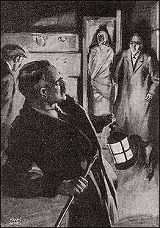When John Mason had left us, Holmes set to work making a very careful examination of the graves, ranging from a very ancient one, which appeared to be Saxon, in the centre, through a long line of Norman Hugos and Odos, until we reached the Sir William and Sir Denis Falder of the eighteenth century. It was an hour or more before Holmes came to a leaden coffin standing on end before the entrance to the vault. I heard his little cry of satisfaction and was aware from his hurried but purposeful movements that he had reached a goal. With his lens he was eagerly examining the edges of the heavy lid. Then he drew from his pocket a short jemmy, a box-opener, which he thrust into a chink, levering back the whole front, which seemed to be secured by only a couple of clamps. There was a rending, tearing sound as it gave way, but it had hardly hinged back and partly revealed the contents before we had an unforeseen interruption.
Someone was walking in the chapel above. It was the firm, rapid step of one who came with a definite purpose and knew well the ground upon which he walked. A light streamed down the stairs, and an instant later the man who bore it was framed in the Gothic archway. He was a terrible figure, huge in stature and fierce in manner. A large stable-lantern which he held in front of him shone upward upon a strong, heavily moustached face and angry eyes, which glared round him into every recess of the vault, finally fixing themselves with a deadly stare upon my companion and myself.
“Who the devil are you?” he thundered. “And what are you doing upon my property?” Then, as Holmes returned no answer, he took a couple of steps forward and raised a heavy stick which he carried. “Do you hear me?” he cried. “Who are you? What are you doing here?” His cudgel quivered in the air.
But instead of shrinking Holmes advanced to meet him.
“I also have a question to ask you, Sir Robert,” he said in his sternest tone. “Who is this? And what is it doing here?”

He turned and tore open the coffin-lid behind him. In the glare of the lantern I saw a body swathed in a sheet from head to foot, with dreadful, witch-like features, all nose and chin, projecting at one end, the dim, glazed eyes staring from a discoloured and crumbling face.
The baronet had staggered back with a cry and supported himself against a stone sarcophagus.
“How came you to know of this?” he cried. And then, with some return of his truculent manner: “What business is it of yours?”
“My name is Sherlock Holmes,” said my companion. “Possibly it is familiar to you. In any case, my business is that of every other good citizen - to uphold the law. It seems to me that you have much to answer for.”
Sir Robert glared for a moment, but Holmes’s quiet voice and cool, assured manner had their effect.
“ ‘Fore God, Mr. Holmes, it’s all right,” said he. “Appearances are against me, I’ll admit, but I could act no otherwise.”
“I should be happy to think so, but I fear your explanations must be before the police.”
Sir Robert shrugged his broad shoulders.
“Well, if it must be, it must. Come up to the house and you can judge for yourself how the matter stands.”
A quarter of an hour later we found ourselves in what I judge, from the lines of polished barrels behind glass covers, to be the gun-room of the old house. It was comfortably furnished, and here Sir Robert left us for a few moments. When he returned he had two companions with him; the one, the florid young woman whom we had seen in the carriage; the other, a small rat-faced man with a disagreeably furtive manner. These two wore an appearance of utter bewilderment, which showed that the baronet had not yet had time to explain to them the turn events had taken.